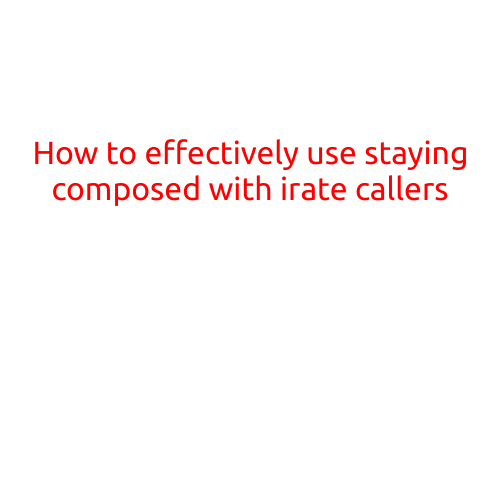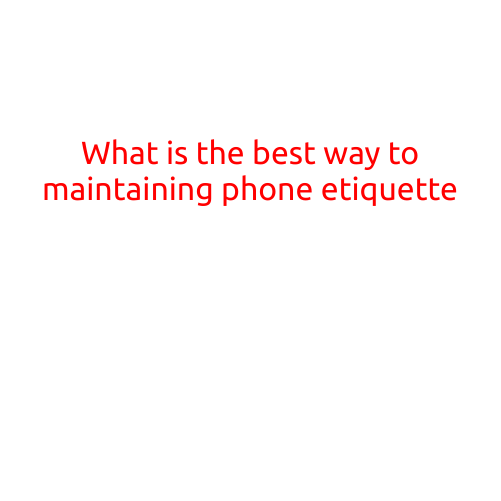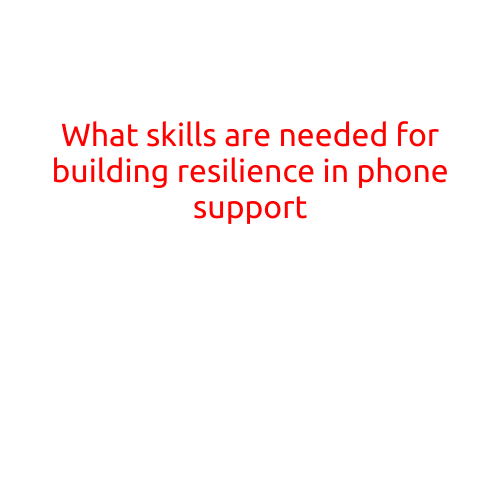
How to Effectively Use Staying Composed with Irate Callers
As a customer service representative, dealing with irate callers is a common occurrence. A customer’s frustration can be contagious, making it challenging to remain calm and composed. However, to resolve the issue efficiently and provide a positive experience for the caller, it’s essential to learn how to stay composed when faced with angry or upset customers. In this article, we’ll explore effective strategies to help you maintain your composure and handle irate callers with professionalism.
Understand the Caller’s Perspective
Before responding to the caller, take a moment to put yourself in their shoes. Try to understand their perspective and the reasons behind their frustration. This empathy can help you connect with the caller on a human level, reducing tension and making it easier to communicate effectively.
Take a Deep Breath and Pause
When a caller becomes irate, it’s natural to feel a sense of anxiety or defensiveness. Take a deep breath, count to 10, or pause for a moment to collect your thoughts before responding. This brief pause can help you regroup and respond more calmly, which can have a calming effect on the caller as well.
Listen Actively
Irate callers often feel like they’re not being heard or validated. To dissipate this feeling, active listening is crucial. Make eye contact, maintain a calm tone, and paraphrase what the caller has said to show that you’re paying attention. This helps to diffuse tension and allows you to better understand the issues at hand.
Stay Calm and Professional
It’s essential to maintain a neutral and professional tone, even when faced with aggressive or abusive language. Use a friendly and respectful demeanor, and avoid taking personal offense to the caller’s words. Remember, the goal is to resolve the issue, not to engage in an argument.
Focus on Solutions, Not Apologies
While apologizing for an issue is crucial, dwelling on apologies can sometimes escalate the situation. Instead, focus on finding solutions and providing alternatives to resolve the problem. This proactive approach can help shift the caller’s attention away from their frustration and towards a resolution.
Empathize and Validate
Acknowledge the caller’s feelings and validate their emotions. A simple phrase like, “I understand that this is frustrating for you” or “I can imagine how you’d feel in your situation” can go a long way in calming the caller.
Know When to Transfer or Escalate
Not all issues can be resolved by a single customer service representative. Know when to transfer the caller to a higher authority or a specialist who can assist with the issue. This can help prevent further escalation and ensure that the problem is resolved efficiently.
Debrief and Reflect
After the call, take a moment to reflect on how you handled the situation. Identify what worked well and what didn’t, and adjust your approach accordingly. Debriefing with your team can also help you learn from each other’s experiences and develop more effective strategies for dealing with irate callers.
Conclusion
Handling irate callers effectively requires a combination of empathy, active listening, and professionalism. By staying composed, focusing on solutions, and validating the caller’s emotions, you can turn a negative experience into a positive one. Remember, the goal is to resolve the issue and provide a positive experience for the caller. With practice and patience, you’ll become more confident and skilled in handling challenging customer interactions.





